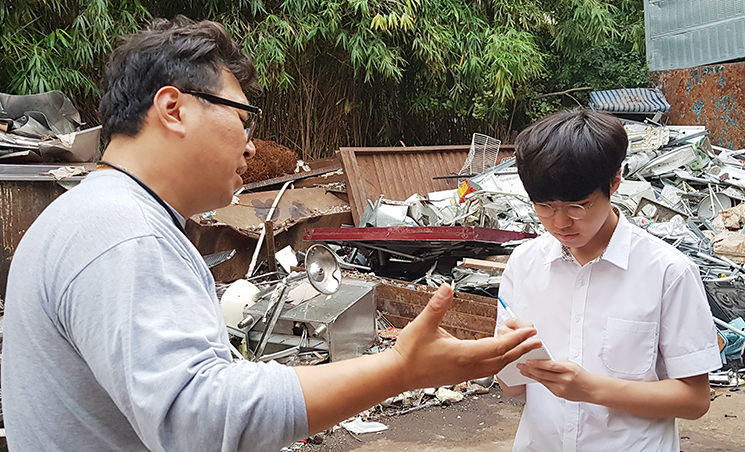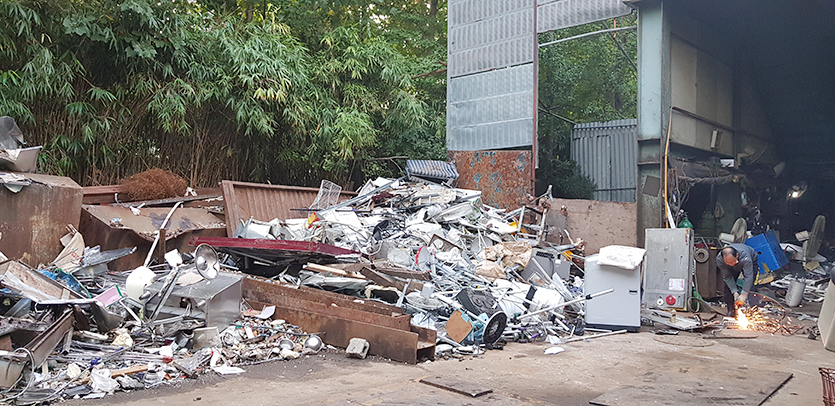Ever since separate waste collection was made nationwide in 1995, the amount of waste decreased significantly (in general) while at the same time increasing the amount of recycled waste. According to the Korea Resource Recirculation Information System (recycling-info.or.kr), the amount of disposed waste was 373,312 tons in 2011, a figure that increased to 415,345 tons in 2016. Also, the amount of disposed waste has increased by 11.3% over the past five years. The increase in the amount of recycled waste being larger than the increase in the amount of disposed waste shows the importance of recycling wastes and turning them into useful resources. Recyclable waste, mostly paper boxes and plastic bottles, is easily seen easily lying around on the streets outside of shops, restaurants, and houses. These wastes are collected and brought to recyclable resources centers, where they are bought and sold.
Attention is rarely given to the people who work at these centers, who help to make our surroundings cleaner and safer. I interviewed Myung Rak Lee, the owner of Woojin Resources, a small waste collection business in Seoul’s Seocho-gu district, to learn more about how recyclable waste is collected and sold. He purchases recyclable waste that people bring to the center and sells them to recycling companies. He sometimes takes his truck to collect big or heavy items of waste. He works with three to four employees on weekdays, from six in the morning until six in the evening. However, the working hours are flexible due to the fact that people sometimes bring recyclable wastes at odd hours and Lee wants to let them be able to bring in waste without having to worry about time.

The recyclable waste is usually brought to the center by senior citizens who make a living from selling them to Lee. These people can be seen on the streets, pushing carts with paper boxes stacked high in them. They make many rounds of different neighborhoods to collect discarded paper boxes, plastic bottles, and other wastes that are left on the streets outside shops and houses. Lee explained that sometimes they bring non-recyclable waste which he has no choice but to reject since it costs too much to accept and dispose of them. The most common non-recyclable waste that is brought to Lee’s center is nonflammable plastic. I asked if there were any waste that is recyclable yet not very welcome at the center, to which Lee immediately answered, “Plastic, because it takes up a lot of space, is light, and measured in kilograms. This means that no matter how much plastic waste the senior citizens bring, it is not worth very much.” Lee added that in terms of quantity, paper boxes are the most common waste brought to the center. Before the decline of newspaper subscriptions, newspaper was the most frequently-traded waste in most resources centers. Now these boxes are also the most valuable recyclable waste. They are brought in the most and sold the fastest. Unlike other wastes, paper boxes are sold on the day they are brought in. When asked about how he decides the prices of the wastes, he explained that he follows the International Raw Material Price Index. The prices of steel or nonferrous metals follow the LME (London Metal Exchange) standard, although there can be a slight difference between the international prices and local prices according to changes in the Korean market.
“It’s a shame that some people disrespect the elderly people who collect wastes from the streets when in fact they are actually helping to clean the streets, so they should not be treated that way. They are honest people making an honest living.” These people are the ones who are doing the job that we are supposed to be doing but are not. When asked about how he feels about being in this particular line of business, Lee said, “We are the ones who do the so-called ‘dirty work’ and make the neighborhood cleaner and contribute to the economy of the country by helping to recycle waste. I love this job and am proud of it.”

People like the elderly cart pushers and recyclable waste collection business owners such as Lee do what some people might consider as “dirty work,” and their work goes largely unrecognized. They deserve more respect and credit for everything that they do for the environment.

Sewon Han
Sophomore (Grade 10)
Shepherd International Education

